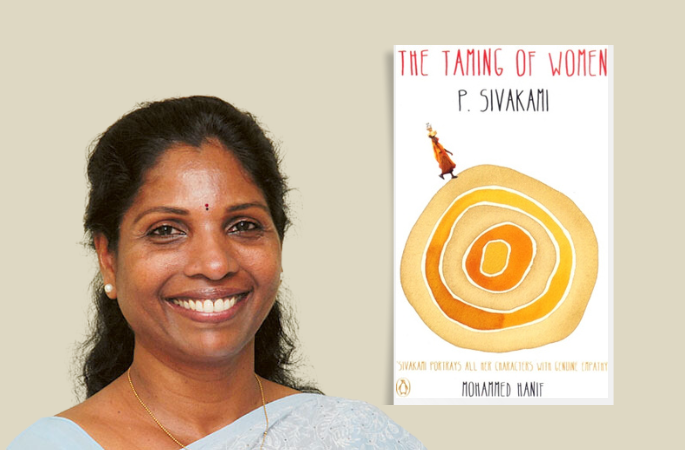Palanimuthu Sivakami or P. Sivakami is a bureaucrat turned writer, feminist activist and political rights campaigner. She writes about Dalit lives, with a special focus on the problems encountered by Dalit women in rural Tamil Nadu. She believes Dalit women are at the bottom of the social hierarchy and treated as worse than animals.
Sivakami’s first novel Pazhaiyana Kazhithalum was the first Tamil novel by a Dalit woman. She refuses to be branded as a “Dalit writer” because she believes it limits her identity and categorises her as someone who belongs to a particular caste. She translated her first book into English, published as The Grip of Change in 2006. Her second novel Anandhayi was translated into English by Pritham K. Chakravarthy as The Taming of Women. Her third novel Asriyar Kurippu or Author’s Notes, is a sequel to her first novel, The Grip of Change. She has undertaken a dispassionate and impartial assessment of her first novel in the sequel to it. She firmly believes that she must consistently write and talk about discrimination against women on the basis of their caste and gender.
Deepa Nair teaches English literature at Sree Ayyappa College for Women, Chunkankadai, Nagercoil.
1. What motivated you to write The Grip of Change? Can you throw some light on the process of translating Pazhaiyana Kazhithalum into English?
In short, it was a spontaneous expression. At first, I thought the translation of my novel was going to be a difficult task. Still, as I started working on it, I found it interesting and occupying, and later, I was totally enjoying it. Of course, I couldn’t find parallels for certain words, which was challenging.
2. What do you think about the current national scenario and its impact on Dalit lives?
The rising Hindu nationalism, in other words, religious fundamentalism, has an adverse impact on the Dalit lives as they were forced to follow the casteist mainstream. And the worst part is that the illiterates among them are fearful of disobeying the caste masters and do not dare to challenge them in any form.
3. Do you regret joining the Indian Administrative Service?
I don’t regret joining the Indian Administrative Service as it gave me enormous mobility and strength so that I could later create a wider network and start building a movement to fight against injustice both within and outside.
4. After quitting the civil service, you joined politics and contested the 2009 parliamentary elections from Kanyakumari. Do you think your defeat in the elections was based on a rejection of your caste identity?
After quitting the service, I found the political field was vacant in Tamil Nadu compared to UP, where Kanshiram had built a strong movement. Impressed by Shri. Kanshiram and his dedicated fieldwork, I joined the BSP. But later, I understood that Mayawati had no plans for Tamil Nadu. Contesting at Kanyakumari was a routine BSP exercise; I didn’t expect anything from it. If illiteracy among caste Hindus is the only impediment against the abolition of caste, Kerala and Tamil Nadu would have achieved casteless status long ago. Though I was appealing to the educated masses, during the election campaign, I knew that caste and religion as a fundamentalist combined force have no shame in exhibiting their assertion in a power play such as the general election.
5. Do you think there are any intersections between the condition of Dalit women in Tamil Nadu and the plight of Muslim women in the Middle East?
As oppressed women, Dalit women have intersections with all the oppressed women worldwide, including Muslim women. However, poverty, deprivation, penury and caste injustice make their position unique and more complex.
6. Why was a re-examination of The Grip of Change necessary? Did you feel that you had not done justice to Kathamuthu’s portrayal? Is that why you revisited The Grip of Change in Author’s Notes? In the novel, the relationship between the protagonist Gowri and her father, Kathamuthu, is troubled. Is it in any way a reflection of your relationship with your father?
I had to revisit the novel The Grip of Change as I was losing hope in the Marxists in Tamil Nadu as being a believer earlier (inadvertently). Maybe, Gowri’s relationship with her father also needed re-examination! Later, in a short story, I wrote that children should never become like their fathers. In another short story, I have portrayed how we all become like our fathers as we grow up. It is not about the estranged relationship between Gowri and her father, but the patriarchal power that shapes all or most female lives here, and I was concerned. Whether Gowri or Sivakami, those characters have lent their lived experiences to convey the message to the readers.
The general awareness among women about their rights in India is increasing. Social media is educative. Almost everyone is accessible. ( In my most recent survey in four villages in Tamil Nadu, the rural women furnished the mobile phone numbers of their husbands and not theirs, implying that they didn’t have either mobile phones or their means of communication were controlled by their husbands.)Their increased awareness had obtained them the all-women police stations, stringent laws for crimes against women, specialised NGOs, human rights commissions, women commissions and certain other Government programs. But the crimes against women are on the increase year after year. Their awareness does not match economic independence and the creation of assets in their names. What can one expect from a wide-mouthed woman who has no money purse?
Globalism and capitalism, or global capitalism, cannot survive with fair means of financial and service (labour) operations. The assumptions are, therefore, that somewhere somehow, some people are put into hardships, exploited or worse, hit. Who could be those men and women? In Tamil Nadu, there is a large presence of ill-clad, poorly paid labour from Northern India. Assuming that Tamil labourers had the benefit of upward mobility due to global capitalism, it is the men and women labourers from northern tribal states of eastern India and Nepalese who had to bear the cross. The recent economic development or growth has taken a toll on the small and marginal farmers, petty shop owners, retail sellers and producers of the local market and petty traders. Needless to say that women are the worst affected. Thus all women cannot share a common future unless and until the specific needs of disadvantaged groups are taken care of separately.
Both men and women are moulded by the existing societal values. They face many challenges in this world commonly. Even if we don’t believe in the theory of creation that men and women are created for each other, we believe in a common and shared living. Therefore, in a normal society, defiance and submission are equally applicable to all genders. Women are more defiant in a patriarchal society. There is no denying that their happiness lies in their dignified living and equal treatment. Depending on life conditions, they need to play different roles.
A person has several identities, and they have their impact on her or his behaviour. The multiple voices from within are the results of various interplays between dominant identities. These identities are not only personal or emotional but are also social, having specific duties and responsibilities. For example, as a daughter, Gowri, in the grip of Change, is affectionate/ hateful and obedient to her father. However, as a woman, she is defiant of his authority and wants to fight injustice. As you pointed out, it is difficult to provide space to all the voices within oneself, and it is quite likely that such a fair play of all those voices will turn against one’s own self-interest.
………….
Palanimuthu Sivakami’s unwavering dedication to advocating for Dalit women’s rights, her courage to challenge societal norms, and her nuanced approach to storytelling have cemented her legacy as a trailblazer in the literary and social justice realms. Her journey serves as an inspiration to those striving for equality and change, reminding us all that through persistent effort and unwavering belief, transformation can be achieved.



